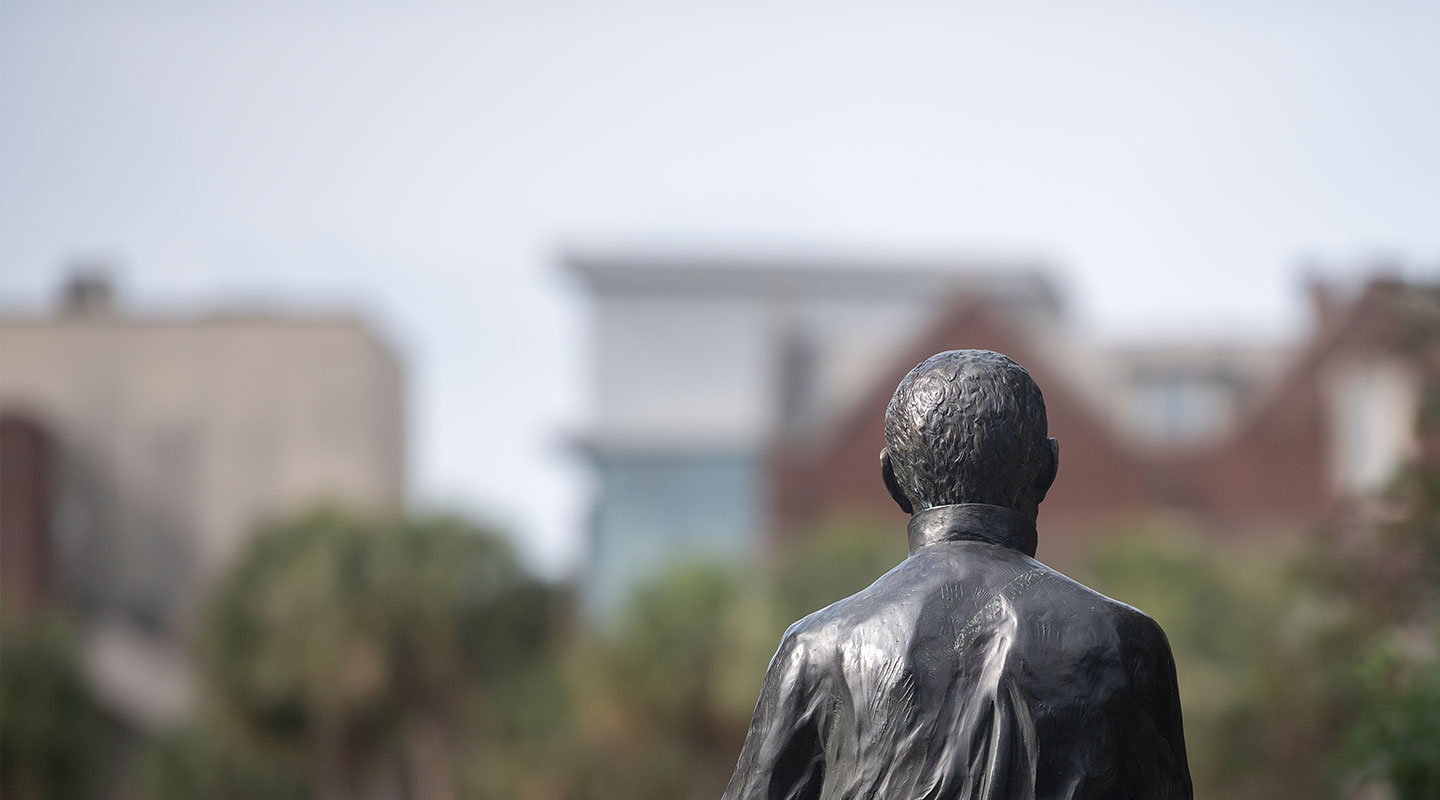Acting in Service to Others
At Loyola University New Orleans College of Law, our mission as a Catholic institution in the Jesuit tradition is at the root of all that we do.
As the first and only Jesuit law school in the South, we are proud to offer programs and educational opportunities that emphasize service to others, critical thinking, and care for the whole person. We encourage our students to seek creative answers, challenge each other with compassion, and pursue excellence in all that they do. The Jesuits call this magis – a Latin term meaning “greater” – which is a reminder to become your best self and seek the greater good through thoughtful discernment.

A Long Tradition of Linking Faith With Justice
Our rich Jesuit heritage dates back to 1540, when Saint Ignatius of Loyola founded the Society of Jesus, whose members are called Jesuits. Located primarily in large cities, Jesuit law schools were among the first to provide access to women and people of color, and to offer both day and evening programs of study.
Making a Positive Impact
Loyola’s College of Law was founded more than a century ago, offering an evening program catered to working professionals and taught by practicing attorneys and judges who volunteered their time. We continue this mission today by prioritizing mission and identity on our campus and creating a space where students of all backgrounds and experiences feel welcomed and supported. The ultimate goal of Jesuit education is to form people who are passionate about building a society that is both just and charitable.

Who is St. Ignatius?
St. Ignatius of Loyola was originally a courtier and soldier whose leg was crushed by a cannonball in combat. In his long convalescence he experienced a spiritual awakening and decided to dedicate his life to Christ. His early efforts at sharing his spirituality led him to see that he must become a priest. He began an educational process from what today we would call elementary education, but it culminated in a master’s degree from the University of Paris, the greatest university in Europe at the time.
Founding of the Jesuits
After a lengthy process, he and a small group of fellow students decided to begin a religious order. They envisioned the members of this Society of Jesus (popularly called the Jesuits) as missionaries who would serve as “contemplatives in action.” As a lifelong learner, Ignatius made education central to the Society of Jesus, and Jesuits have a long tradition as teachers. As superior general, St. Ignatius spent the rest of his life writing the Constitutions of the Society of Jesus (the book of rules for the Jesuits) and administering the rapidly growing Society of Jesus.
What does it mean to be a Jesuit institution?
Today, hundreds of Jesuit educational institutions exist around the world accepting students of all faiths and of no particular faith. As a member of the Association of Jesuit Colleges and Universities, Loyola is one of 28 distinct schools located in North and Central America that are united by our shared Jesuit, Catholic mission and values.
Our programs of study share a distinct Jesuit heritage, one which values the pursuit of academic excellence, acquisition of knowledge for the betterment of society, care and concern of the individual, and preparation for public service.
It is our goal, as a Jesuit institution, to equip our students with all information and resources available in order to make thoughtful and independent decisions in pursuit of a more just and fair society.
We accept all opinions, ideas, and beliefs and encourage open discussion of the law in the context of current challenges facing our society today.
While public interest law is an important facet of our Jesuit identity and is closely linked to the emphasis on social justice, Loyola’s Jesuit mission is relevant and applicable to all lawyers and all specializations of the law.
What are Loyola’s Jesuit values?
Jesuit values guide Loyola University New Orleans. Our Jesuit values bring us together as a community, but they do not exclude our student population. Regardless of religious affiliation or beliefs, our Jesuit values are centered around a shared goal to create a more just and equitable society. It’s our goal to develop legal professionals who use discernment and critical thinking to make decisions for the greater good, acceptance, and celebration of all people.
-
Developing a Discerning Mindset: Finding God in All Things
-
Acting in Service to Others
-
Learning From Experience
-
Caring for the Whole Person
-
Walking with the Poor, the Outcast, and Those Whose Dignity has Been Violated
-
Fostering Reconciliation
-
Developing Critical Thinking and Effective Communication
-
Forming an International and Global Perspective
-
Linking Faith with Justice and Reason
-
Growing in Appreciation of Things Both Great and Small
-
The Development of Personal Potential
-
Respect for the World, Its History, and Mystery
-
Embracing a Contemplative Vision of a Hope-filled Future
-
Care for our Planet as our Common Home
